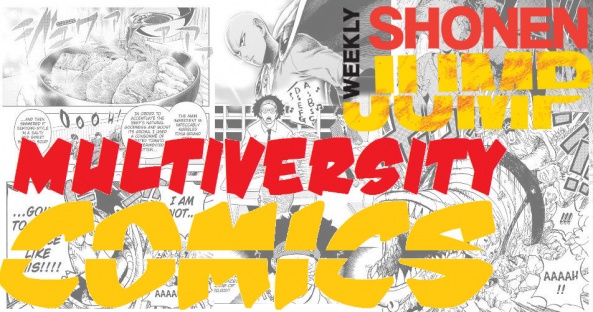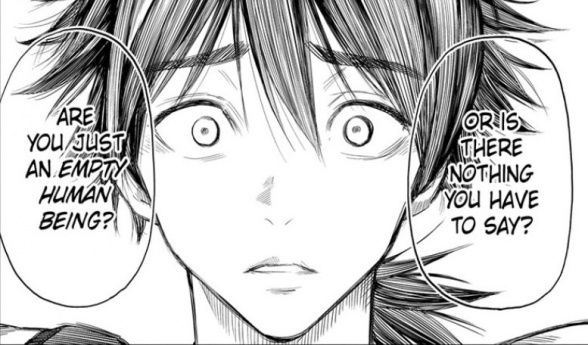
Welcome to This Week in Shonen Jump, our weekly check in on Viz’s various Shonen Jump series. Viz has recently changed their release format, but our format will mostly remain the same. We will still review the newest chapters of two titles a week, now with even more options at our disposal. The big change for our readers is that, even without a Shonen Jump subscription, you can read these most recent chapters for free at Viz.com or using their app.
This week, Vince and Zach are checking in with “Time Paradox Ghostwriter” and “Act-Age.” If you have thoughts on this or any other current Shonen Jump titles, please let us know in the comments!

Time Paradox Ghostwriter: Chapter 3 – Two of a Kind
Written by Kenji Ichima
Illustrated by Tsunehiro Date
Review by Vince J Ostrowski
Put simply, in the first 2 chapters of “Time Paradox Ghostwriter”, our main character Teppei finds himself in a fantastical situation wherein he ends up plagiarizing the work (called “White Knight”) of a manga artist 10 years in the future. The fascinating aspect of this is that, in the beginning, he doesn’t realize he’s plagiarizing an actual creator, yet even after he learns the truth, he decides to push forward. He copies the future work in the present timeline and presents it as his own, as he is a budding manga-ka himself. His motives and the actual mechanics of this are a little more complex than that, of course, this being a shonen manga. Nonetheless, this series thus far is based entirely around an act of plagiarism – a concept that is universally understood to be immoral.
Chapter 3 finds Teppei confronted with the future creator of “White Knight” and his having to explain himself to her. What unfolds is a chapter devoted to an exploration of imposter syndrome. Teppei wants badly to be a Manga artist, but to this point has had nothing to say with his art. Anyone who’s ever felt creatively hampered by a lack of a personal style or voice, or even suffered from just a temporary bout of writer’s block, can relate to this. The interaction plays out between them in a compelling back-and-forth while Teppei’s inner monologue constantly plants seeds of self doubt. That’s the interesting thing about “Time Paradox Ghostwriter” – it doesn’t let him off the hook. It doesn’t condemn him either, and that could be a tough trick to pull off, but it’s refreshing to see a shonen manga display this much ambiguity about how we’re supposed to feel about its main character.
One downside of this sort of philosophical exploration is that the art isn’t much to speak of. The characters are handsomely and cleanly rendered, and the appropriate emotional investigation is present and accounted for in the art, but there’s nothing in the way of a setting or any action. It’s just not that kind of manga at this point, so there’s nothing to talk about. There’s nothing to visually ground this chapter in any place or time, other than the exposition telling us. In a series that continually asks the main character whether there’s anything only he can uniquely draw, I have to wonder whether this series is result of the creators themselves working out some of their own history with creative blockage.
“Time Paradox Ghostwriter” is potentially walking a very thin line and could easily fall into troubling territory. On the other hand, if the manga-ka are self-aware enough to have identified the obvious problems with the plagiarism premise, they could easily mine this complicated conflict for lots of potential drama and character growth. There are signs they’ve planted seeds to do just that, and this manga is fascinating enough to warrant reading onward to see if that’s the case.
Final Verdict: 7.0 – Chapter 3 of “Tim Paradox Ghostwriter” continues to unveil a very promising, yet morally complicated and visually ordinary beginning to this series

Act-Age Chapter 114
Written by Tatsuya Matsuki
Illustrated by Shiro Usazaki
Translated by Camelia Nieh
Lettered by Eve Grandt
Reviewed by Zach Wilkerson
This chapter finds Yonagi and Kuroyama on their way to see one of Kuroyama’s films. This is the first time Yonagi will see a film by this director she adores, so she’s understandably a little apprehensive. If she doesn’t like Kuroyama’s work, their future collaborations may already be in jeopardy. Since Kuroyama’s film isn’t until later in the evening, the pair take in a day of film, which reads like an absolute dream in the time of COVID-19.
Continued belowUsazaki’s pencils in this chapter are simple and minimalistic. Her characters are reserved, showing just a few flashes of emotion in response to a specific film scene. Her backgrounds are staged in a similar fashion, with just a few specific items setting the scene. While not dramatically distinctive, her work has the aloof yet charming quality of the art house films she’s attempting to depict.
Reflecting on the nature of acting in what seems to be the iconic Starbucks location overlooking Shibuya Crossing, Yonagi discusses the dilemma of an actor whose own nature is drastically different from the character they play. This leads to a sort of “overacting,” to paraphrase Yonagi’s point. Applying this idea to “Act-Age,” the creators are working well within their wheelhouse. There’s a synergy between Usazaki’s pencils and Matsuki’s script that feels appropriately sparse but never underdeveloped.
The chapter builds to the moment of Kuroyama’s film, depicting the life of a woman without ever showing her face. The film leaves Yonagi and the other viewers somewhat perplexed. Kuroyama explains the circumstances of the film’s creation and Yonagi comes to appreciate it. There’s a tangent here as Yonagi reflects on a statement of a fellow actor, that an actor’s dream is to fall in love with a director who is in love with you. Of course, running in “Shonen Jump,” it’s unsurprising that there’s a romance component. We find that the dilemma of compatibility in film tastes is a not so subtle stand-in for the pair’s relationship potential. While this does lead to some less than savory conclusions, as Yonagi’s future as an actor rides on her relationship with Kuroyama, there is a sense of “feel good,” hopeful romance that is quite enjoyable.
Final Verdict: 7.0 – Despite it’s minimalism, or perhaps because of it, this chapter of “Act-Age” leaves a sense of longing and romance, just like a good film.






